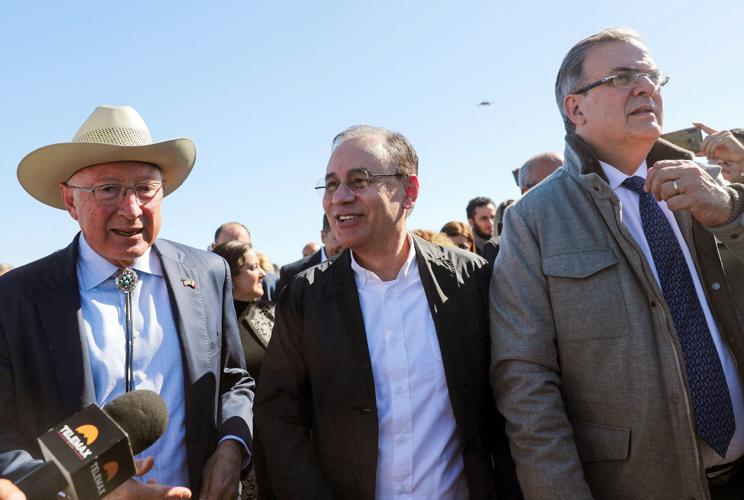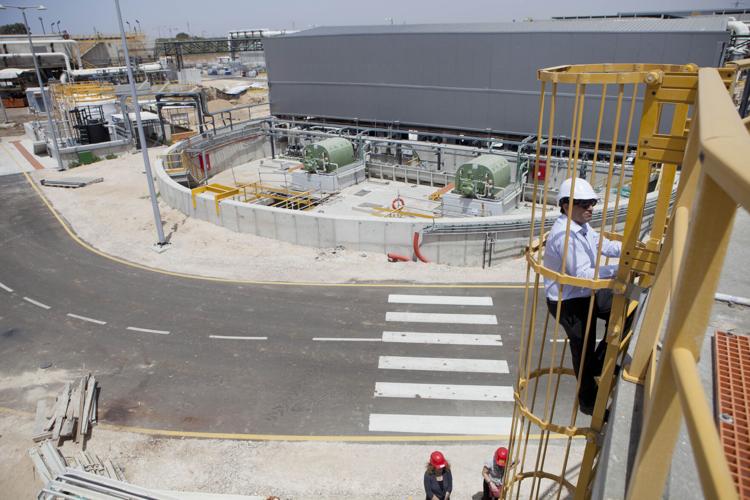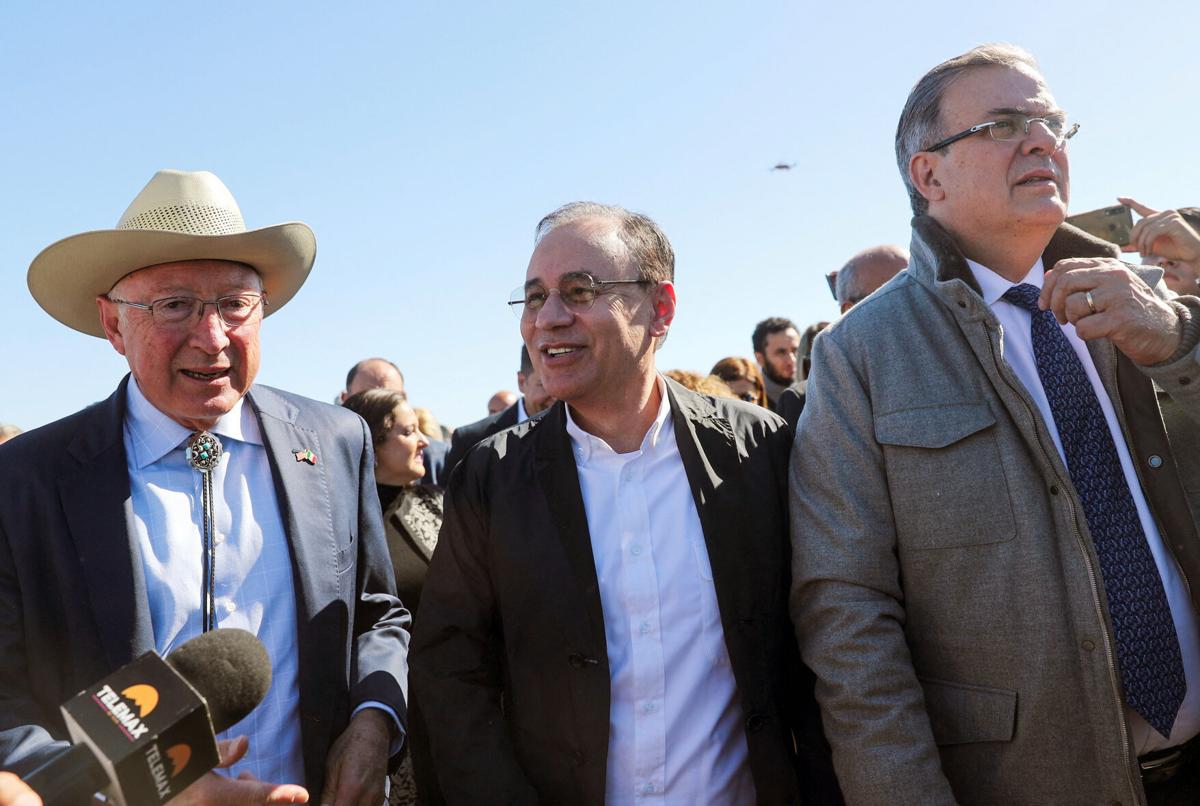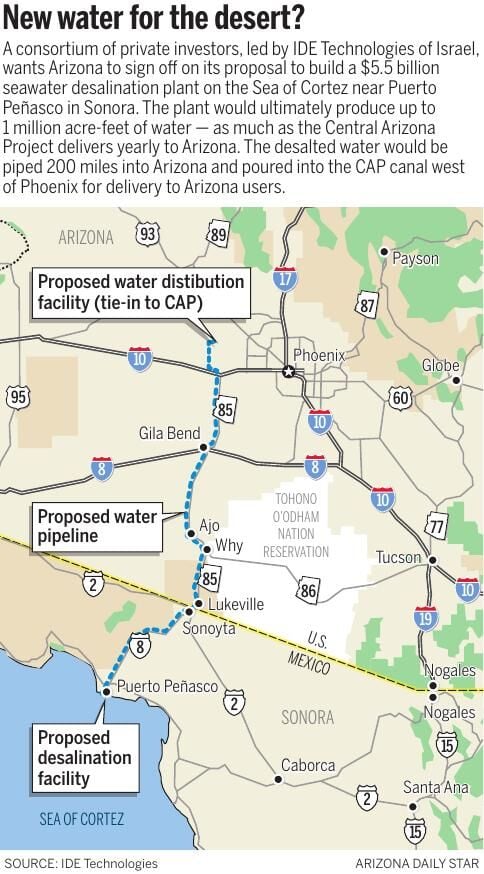GUAYMAS, SONORA — Sonoran state officials are throwing cold water on a fast-moving $5.5 billion proposal to build a massive desalination plant in Puerto Peñasco, Sonora, and pipe much of the water 200 miles to Arizona.
“It’s total absurdity,” Sonoran Gov. Alfonso Durazo said in a news conference last week, responding to the assertion that Sonoran officials had already given support to the project’s backers.
Durazo acknowledged meeting with representatives from Israel-based IDE Technologies, the company that wants to build the plant, but not to discuss shipping water to Arizona. He said the meeting was about desalination technology generally.
“I am not going to deny the interest that I have in knowing the technologies that exist for desalinating water, because eventually it will be a necessity in our state,” he said in the Jan. 31 conference.
Durazo said IDE Technologies misrepresented the meeting, and he vowed not to meet with them again.
“At no time was there talk of the provision of desalination to supply water to Arizona. At no time,” he said.
Also on Tuesday, the Sonoran state government’s official Twitter account issued a series of tweets criticizing IDE Technologies for a “lack of ethics” and characterizing the desalination project as a collaboration between former Sonora governor Claudia Pavlovich and former Arizona governor Doug Ducey.
Those tweets came in response to an El Imparcial editorial that criticized the Sonoran government for supposedly expressing support for the project without public discussion.
Durazo said unless it serves the interests of Sonorans, the desalination project won’t happen.
“My first reaction was, they are going to take the water and leave us the mess,” Durazo said. “I’m going to defend the interests of Sonorans. That is my responsibility.”
Federal issue
In his Tuesday comments Durazo also emphasized that water issues are in the federal domain.
A week prior, Mexico’s president Andrés Manuel López Obrador responded briefly to a reporter’s question about the IDE proposal.
In the Jan. 24 news conference, López Obrador appeared more optimistic than Durazo. He said he’s aware of the proposal and that a consultation is necessary to ensure the project wouldn’t affect the environment.
“If that possibility does not exist, there is no problem. We are authorizing everything,” López Obrador said.
IDE response
IDE Technologies attorney Jordan Rose, based in Scottsdale, did not respond to the Arizona Daily Star’s email or phone calls late last week, seeking clarification on the company’s communications with Mexican officials.
IDE’s 46-page project proposal states that the company “has done its due diligence to ensure that the Sonoran government is supportive of the project moving forward.”

IDE Technologies' Sorek desalination plant in Rishon Letzion, Israel. The company now proposes to build a desalination plant in Sonora and pipe water to Arizona.
And during a Dec. 20 joint legislative water committee hearing, IDE representative Erez Hoter-Ishay told Arizona legislators that IDE had received support from both the Sonoran state government and the Mexican federal government.
He said the company met with Sonoran Gov. Durazo in July 2022, “to present and to answer all the questions about the environmental issues, because he wanted to have that comfort. I mean, the desalination facility will be built there. So after they received the comfort, and they contemplated, they came back with the support.”
Rep. Andrés Cano, D-Tucson, then asked if IDE had a letter of support from Mexican officials. Hoter-Ishay said IDE has not yet requested that.
“It’s not usually how it would be done. It’s done delicately,” he said. “But of course there will be.”
Longtime Arizona Daily Star reporter Tony Davis talks about the viability of seawater desalination and wastewater treatment as alternatives to reliance on the Colorado River.
Hoter-Ishay told the committee IDE must complete an environmental review in Mexico, just as it must comply with the National Environmental Policy Act (NEPA) process in the U.S.
Fast-track project
On Dec. 11, IDE Technologies first contacted the chairman of a state water board, the Water Infrastructure Finance Authority of Arizona, or WIFA, about IDE’s proposal for “an innovative and transformative project that will supply the State of Arizona with a new assured water supply.”
Within nine days, WIFA’s board members had voted unanimously to engage in discussions with IDE on the proposal, which would initially provide Arizona households with 300,000 acre-feet annually of desalinated water from the Sea of Cortés.
IDE, which operates desalination plants across the world, including in Carlsbad, Calif., hopes to eventually expand the plant to pump 1 million acre-feet of water to Arizona each year. It would also provide water to the Sonoran cities of Nogales, Hermosillo, Sonoyta and Puerto Peñasco, known in Arizona as Rocky Point.
The company aims to complete permitting and construction in time to start delivering water by late 2027.
Previously a small agency, WIFA was dramatically expanded last summer when the Arizona Legislature agreed to give the entity $1 billion over three years and the legal authority to approve water-augmentation projects for the state. IDE’s proposal is WIFA’s first major project under consideration.
But the Star reported in January that critics, including state legislators, have been alarmed by the sudden emergence of the proposal and its fast-tracked consideration by the WIFA board.
WIFA director Chuck Podolak said on Friday that in-depth analysis of IDE’s proposal is only just beginning.
“I hope people don’t think we are further along in this process than we are,” he said in an interview. “We’ve had an interesting proposal, and now we are (under)taking a thorough process at WIFA to really evaluate the feasibility of this project, and whether it’s a good investment for us.”
Regarding the dust-up between IDE and Sonora’s governor, he said, “I think it means the project’s proponents have some work to do, both in Mexico City and in (Sonora’s capitol) Hermosillo.”
Podolak said he remains open-minded about the project’s potential.
“If it can meet the significant hurdles for any giant, game-changing project like this, it would be phenomenal,” he said. “It’s worth our time to continue to look at this and to continue to do our own due diligence.”
‘No room for error’
Former State Sen. Lisa Otondo, D-Yuma, who left office in January, has been critical of IDE’s proposal, particularly its lack of detail on water costs and the appearance of “backroom dealing.”
In a Friday interview, Otondo said Arizona urgently needs water-augmentation projects, so it’s crucial that efforts to develop those solutions are carried out transparently, cautiously and with good communication between potential partners.
Her “greatest fear” is that unforced errors could undermine efforts to solve the problem of water scarcity, she said.
“We need to find augmentation, and there’s really not a lot of room especially for political error, for the types of things that have happened now by angering the governor of Sonora,” Otondo said. “There’s no room for error.”
The apparent miscommunication with Sonoran state leadership seems likely to undermine IDE’s ambitious timetable for its project, Otondo said.
“It’s complicated everything,” she said.







